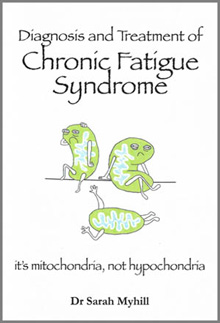|
|
Diagnosis and treatment of Chronic Fatigue Syndrome by Dr Sarah Myhill Michelle Berriedale Johnson reviews her book |
Mitochondria are the tiny structures or 'engines' Together with Dr McLaren Howard of Acumen Laboratory and Dr Norman Booth of Mansfield, College Oxford, Dr Myhill has now shown that poorly functioning mitochondria provide the key to CFS - their research studies are to be found published in the peer reviewed International Journal of Clinical and Experimental Medicine: Chronic fatigue syndrome and mitochondrial dysfunction - 2009 During the course of her researches she has been logging her findings, and her treatment protocols based on those findings, on her website, DrMyhill.co.uk. Now those findings have been put down in print in her new book - and they are fascinating. Partly because her findings about CFS and the role of the mitochondria in it are so fascinating – but also because she writes so very readably. Only on page 3, for example, she says: A useful analogy in understanding the mechanisms of this illness and recovery is to compare the human body to a car. If the body is a car then, to get it to go you need: • Engine – Mitochondria So, immediately, the complexities of how mitochondria work and why their malfunction can have such wide ranging implications, becomes so much more understandable - and so much less intimidating. Before going on to explain in great detail exactly how mitochondria work, how they should function and how it is that they often do not, she lists the six most usual causes of mitochondrial failure: 1. Genetics - often down the female line. And good sleep, and plenty of it, is one of the most crucial elements in her protocol for treatment – which is what takes up most of the rest of the book. Although every CFS sufferer is different, Dr Myhill has a basic protocol which she requires all her patients to follow before addressing their more individual problems – and it is focused on rebuilding the structures underlying the health of the mitochondria. To re-use the car analogy – it is no good just filling the tank with fuel – or unblocking the fuel pipe – or cleaning the spark plugs – or unblocking the air filter. If you want to the car to work you have to do all of these things. In the same way, the CFS sufferer needs to pace themselves (so as not to exhaust their limited store of energy to the point that there is none left for recovery), rebuild their nutritional status, sleep (properly and for nine hours between 9.30pm and 6.30am) and eat a Stone Age, low GI diet which avoids all the major allergens and includes lots of probiotics. Once these are in place the patient is ready to move forward. I could continue to quote from the book - but I do not want to deny you the pleasure of reading it! And, if you are reading it because you need her help, not just because you are interested in her theories, then you will to need to read it all – and read it several times. You could, of course, just go to her website and read it all there but the advantage of the book is that it is – a book..... And useful though it is to be able to follow all of the links on the site, it is also nice to be able to read at your leisure and not in front of a screen. So for anyone who suffers from, or knows someone who suffers from, or who works with, Chronic Fatigue Syndrome, I urge you to go and buy this book at once and read it from cover to cover. You can buy it from her site (spool down the News column on the right and you will find instructions as to how to do so) for £13 inc P&P,
June 2014 Click here for more articles
|

 Dismissed for years as 'yuppie flu', malingering or a purely psychological condition, Chronic Fatigue Syndrome (CFS) is still very poorly understood in the wider health community. However, over many years
Dismissed for years as 'yuppie flu', malingering or a purely psychological condition, Chronic Fatigue Syndrome (CFS) is still very poorly understood in the wider health community. However, over many years 










